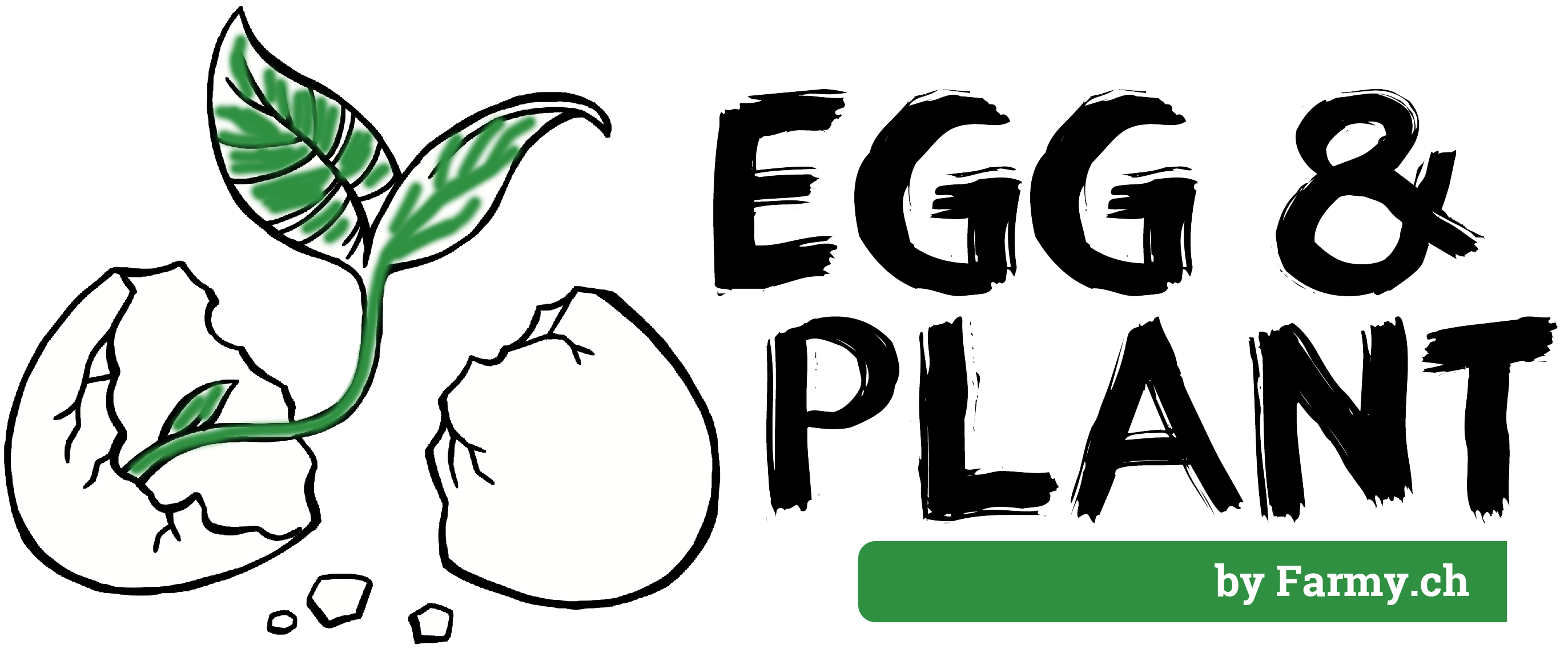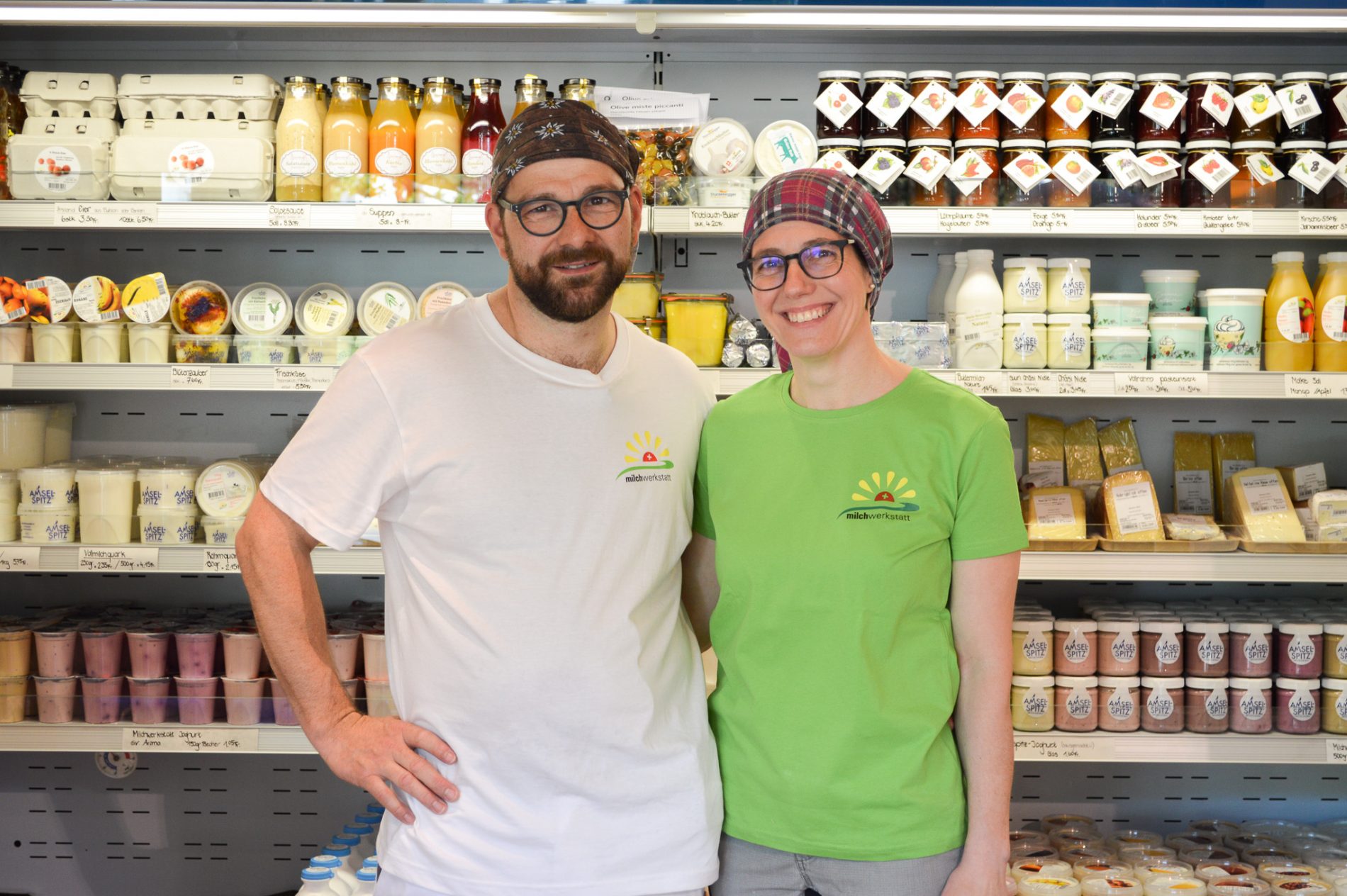They produce neither industrially nor in bulk – and this you can taste. AMSELSPITZ® Milchwerkstatt turns milk into irresistible products that make you reminisce. We were permitted a peek over their shoulder during production.
It all started quite differently
Fredy Niederberger’s father bought the company in Buttikon SZ in 1981 and at that time produced casein, which was also used in the production of glue. It was not until 1997 that the company was converted to produce raw ziger (milk protein). Fredy and Lisbeth finally took over this company in 2001, but sales of ziger became increasingly poor, so they switched to dairy specialities – with great success. In 2017, a self-service shop was added.

How did the name come about?
AMSELSPITZ® Milchwerkstatt is known in Buttikon as Molkerei Buttikon (“Buttikon Dairy”). In fact, the AMSELSPITZ® brand was only taken up in 2002 by a dairy in Einsiedeln, which closed in 2002 and whose licence Fredy Niederberger took over in the process. The yoghurt was given the name AMSELSPITZ® by Elisabeth and Martin Betschart (Einsiedeln dairy) and Urs Reichen (licensor) in 1992 because of the Amselspitz hill, which is located wholly in the district of Einsiedeln.
Fredy has now expanded the brand and specialised in the use of Swiss fruit for their yoghurt, entirely without additional flavourings. The dairy’s goal: to produce dairy products the way people used to eat them at their grandma’s house.
Diligent production by hand
Today, AMSELSPITZ® Milchwerkstatt produces 15,000 jars a week: on average, around 30 yoghurt jars are filled every minute and around 450,000 litres of milk are processed every year. And all this with only 10 employees. But this does not mean that their milk creations come off the conveyor belt. On the contrary: every product is made with love, there is a lot of manual work. This is evident in the production of their yoghurts.

Producing yoghurt naturally
AMSELSPITZ® Milchwerkstatt makes its creamy yoghurts from whole milk from the region and its own recipe using a mixture of bought-in bacteria.
First, milk protein is added to the milk to make the yoghurt creamier and increase the dry matter. After the milk has been heated in a continuous flow heater at 92 °C for 6 minutes and thus pasteurised, it is naturally allowed to cool down to about 38-40 °C to mix in the bacteria. This warmer temperature is important so that the bacteria can multiply and convert part of the lactose into lactic acid. After 6 hours, this process is sufficiently complete and the yoghurts go into the cooler.

Thus, in the case of fruit yoghurt, the fruit can only be added after it has cooled down completely, after approximately 2 days. This prevents a rapid fermentation process. In the afternoon, however, the yoghurts are ready to be transported to the sales outlets, such as Farmy.
What makes AMSELSPITZ® yoghurts so unique
The natural cooling and the associated longer passive time are among the things that distinguish AMSELSPITZ® yoghurts from industrially produced yoghurts. In addition, no additives such as thickeners, colourings or flavourings are added to the yoghurts. As Fredy says, “We don’t want to produce in bulk, we’d rather produce quality and stay on the natural path.”
For more flavour in the fruit yoghurts, for instance, some of the fruit used is pureed. So here it is especially important that the fruits are fresh and untreated and have an intense flavour. Ripe seasonal fruits from Swiss farmers are used for this.

An essential part of yoghurt production at AMSELSPITZ® Milchwerkstatt is, of course, their filling and labelling machine: it was made specifically for their needs by a one-man business more than 20 years ago.


Sustainability is important as well
But AMSELSPITZ® Milchwerkstatt also differs from industrial yoghurt producers in terms of sustainability. The yoghurt is delivered in a glass jar, for example. This can be returned clean by the customers. After a thorough hygiene check, these jars and lids are cleaned again and reused.
In addition, AMSELSPITZ® Milchwerkstatt produces with 100 % hydroelectricity; they obtain their hot water from heat recovery. In the future, solar power will also be added.
Not only yoghurt
In addition to their creamy yoghurt, AMSELSPITZ® Milchwerkstatt also offers other dairy creations:
- their quark, which is produced as in the past using a cheese cloth instead of being industrially pressed through a sieve. In the process, the whey drips off naturally for 24 hours, allowing its natural aroma to unfold.
- cream cheese without thickeners, also made using cheese cloths. Compared to industrially produced cream cheese, which promises 40 kg of cheese, 40 litres of milk yields only about 9 kg of cheese, resulting in a higher price, which, however, is justified by the taste alone. From this they produce the finest gourmet balls, flower magic (in rapeseed oil) and nature cream cheese, cream cheese with pepper, pomodori as well as horseradish.
- butter with the finest cream flavour, but also, for example, their butter roll with fleur de sel and lemon butter.

AMSELSPITZ® Milchwerkstatt has already won several awards at the Swiss Cheese Awards, among others, for its cream cheese – so they are definitely worth a try! As Fredy says: “It’s always a nice little thank you for what we do every day.”
And what does the future hold?
New yoghurt flavours are to be added to the assortment in the future, and the logistics are to be expanded to create more space for production. In this way, the latter is also to be increased somewhat. But only to the extent that the quality can be maintained: mass production is not what the small company has in mind. After all, uniqueness requires time.











What do you think?